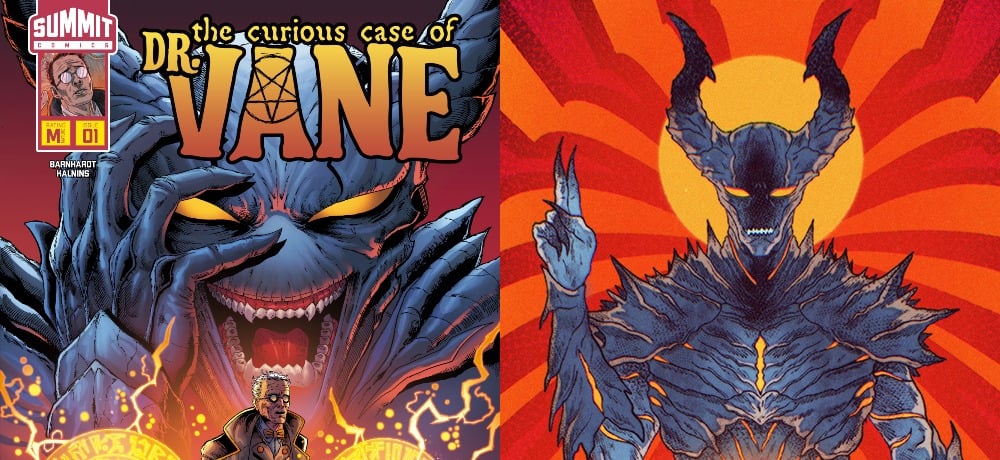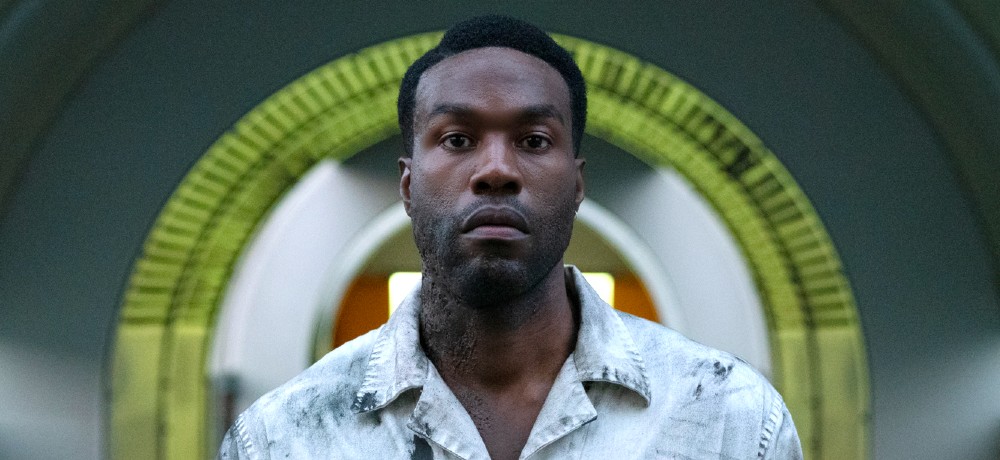






So, here’s the thing: there is so much I want to say about this new Candyman and what I really enjoyed about it, but it would literally involve me divulging the very surprising turns that this story takes, so that’s going to make reviewing the film extremely difficult. But what I can say is that Nia DaCosta does take the Candyman mythology in a boldly unexpected direction here that not only enriches everything we know about this character, but also makes it feel extremely timely and timeless all the same (the latter part of that is truly unfortunate, though, but I’ll circle back on that soon).
I know that doesn’t give you a lot of information to go on, so let’s just go ahead and get to the nuts and bolts of Candyman (2021) and I promise at some point it’ll all come together. At the center of this new story is a struggling artist named Anthony (Yahya Abdul-Mateen II), who is in need of some inspiration for a new art project and finds it in the gentrified neighborhood of Cabrini Green. Anthony sets out in search of the truth about the titular entity that used to terrorize residents of the area, and crosses paths with the mysterious laundromat owner William Burke (Colman Domingo), who recalls to Anthony his own experiences with Candyman. Anthony also happens to get stung by a bee while exploring the neighborhood, which ends up being a bit more of a problem than he initially realizes, as he finds himself undergoing something of a metamorphosis himself, pulling him in closer to the truth behind the legend of the Candyman with monstrous results.
This only really covers about one-third of the new Candyman’s story because, as I mentioned, I really had no idea the direction that co-writers DaCosta, Jordan Peele, and Win Rosenfeld would be taking with their “spiritual sequel” to Bernard Rose’s film, so I appreciated that the trio could find ways to defy any possible expectations I had coming into it. And even though the story takes some wide swings and opens up the Candyman mythology in some rather audacious ways, there’s a lot about Candyman (2021) that feels right in line with Rose’s classic film as well. This new story touches upon some of those original themes in terms of how society often fails communities of color, but it also takes on the issue of gentrification, which is an incredibly harmful practice where POC often find themselves priced out of their communities due to an influx of young and affluent white people taking over their neighborhoods via new housing opportunities, better infrastructure, and increased support from civil and governmental organizations (this was an issue I used to work with closely on Chicago’s West Side, back in my previous life when I worked for a PR firm that specialized in non-profits, so that aspect really spoke to me on a personal level).
Something else I thought was interesting was that Candyman (2021) also recontextualizes the story of Helen Lyle here. After a dinner party involving Anthony, his girlfriend Brianna (Teyonah Parris), Brianna’s brother Troy (Nathan Stewart-Jarrett), and Troy’s husband Grady (Kyle Kaminsky), Troy recalls how Helen came into Cabrini Green in search of the Candyman, and ended up kidnapping a baby with the intentions of killing it. Of course, we know that’s not true (which speaks to the idea of urban legends and how they often get twisted over time), but I do think it was interesting to present Helen’s story in that way, only because her character becoming something of a “White Savior” in the original Candyman hasn’t aged well in the last three decades. And the concept of Candyman also get fleshed out a bit more here, and again, I won’t say too much about just how DaCosta changes things up, but I love that coming out of this new Candyman, the iconic character becomes a symbol representing something that is so much more powerful than just a tortured soul who kills anyone who dares utter his name five times in a mirror.
In terms of the performances in Candyman (2021), everyone in this ensemble does a great job of creating compelling, lived-in characters that feel fully realized on the screen. At the center of it all is Abdul-Mateen II, whose tortured artist finds himself spiraling out of control under the influence of Candyman, and his guttural performance here is absolutely gut-wrenching, especially in the film’s third act. Parris is also equally fantastic, and I loved how conflicted her character Brianna is about what’s happening to her boyfriend, who seems to be spiraling out of control. And even though Brianna is highly emotional about what’s happening to Anthony, Parris’ character still makes intelligent choices that feel measured and grounded, making her journey here extremely relatable to anyone who has ever had to watch someone they love succumbing to destructive forces.
I think if there was one aspect to Candyman (2021) that didn’t quite work as well for me is that this sequel doesn’t quite match the visceral nature of Rose’s original film. And sure, I definitely don’t want DaCosta to feel like she has to stick to anyone else’s vision with her take on this mythology, or follow any predetermined guidelines, either. But in comparison, it just felt like this Candyman was missing a bit of that raw edge that still makes the 1992 film so damn unnerving and unforgettable after all these years (I watched these films back to back, so that difference between them was very apparent once everything was said and done). Visually, though, John Guleserian’s cinematography is excellent in this Candyman (Chicago has never looked eerier), and the special effects during a few of the film’s death scenes are excellent as well. I do wish we had a bit more of Phillip Glass’ iconic Candyman score referenced here, but I also think Robert Aiki Aubrey Lowe’s musical compositions are gorgeous in their own right, and his efforts in Candyman (2021) should be celebrated.
As a whole, I think Candyman (2021) is a film that is going to take a lot of fans by surprise, and I am curious to see how horror enthusiasts react to the new directions DaCosta takes here. For me, I love how confidently she brings the iconic villain into the 21st century, and DaCosta does an incredible job of recontextualizing the legend of the Candyman here, too. It may not quite be the gut-punch cinematic experience most of us felt while watching the original Candyman, but there are still plenty of sweets for the sweet in this sequel for those who are willing to give themselves over to this new take on the Candyman mythology.
Movie Score: 4/5